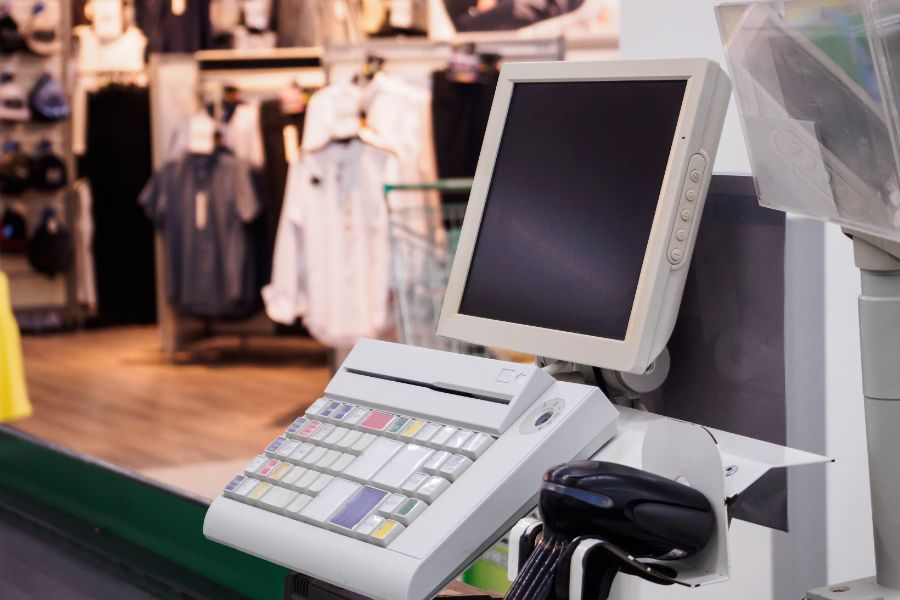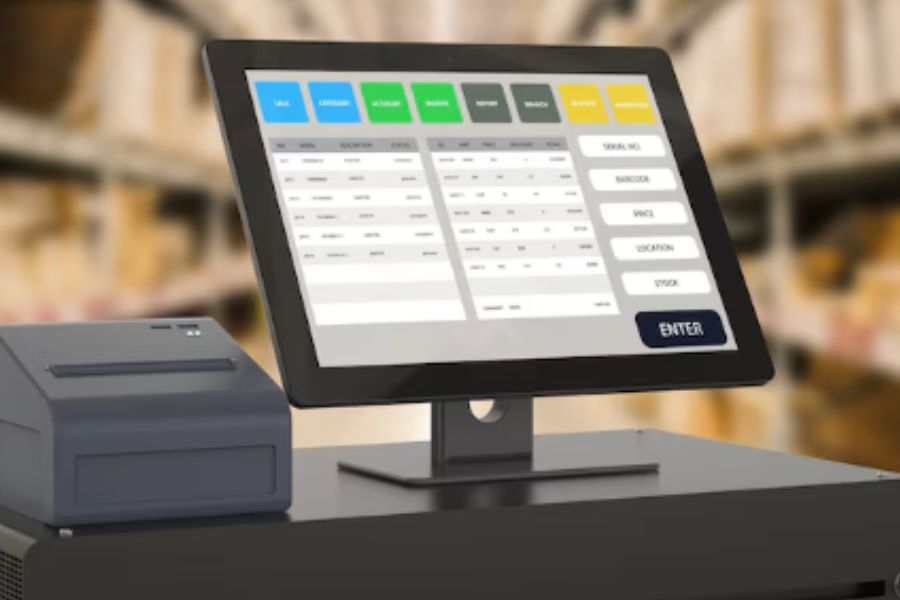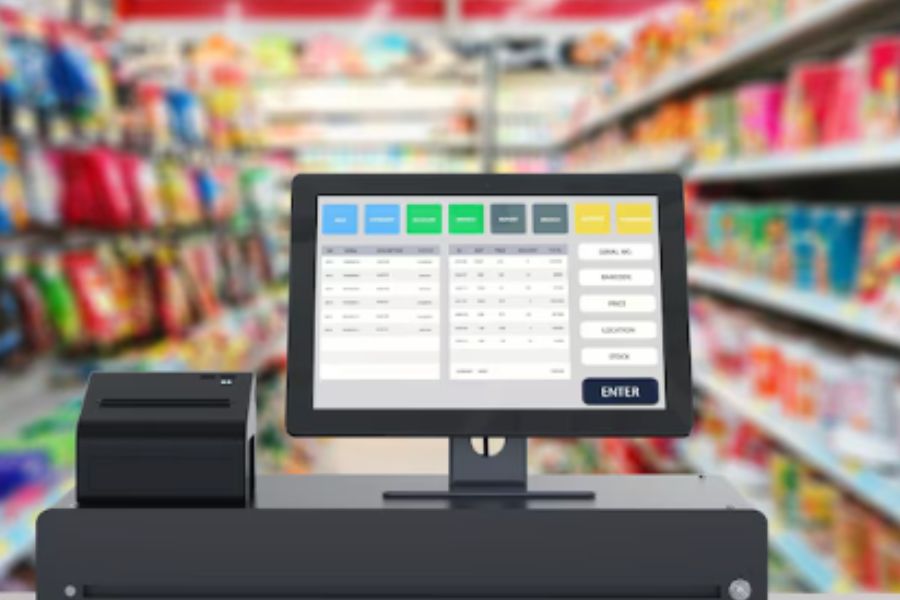In the bustling world of retail, where transactions are swift, and customer interactions frequent, the advent of electronic point-of-sale systems has revolutionized the way business is conducted. However, beneath convenience and efficiency lie crucial considerations regarding security and privacy. In this blog, we will give some of the security and privacy considerations of electronic point of sale system retail stores.
What is an Electronic Point of Sale System? How Does It Work?
Definition
An electronic point of sale system is a digital checkout and cash register system comprising hardware like card readers and payment terminals, alongside software that manages payments, monitors inventory, and executes key retail tasks.
With an EPOS system, you can seamlessly conduct transactions and oversee retail operations using just one device, even if you operate in various locations and sales channels.
How Does Electronic Point of Sale System Work?
Both traditional cash registers and modern EPOS (Electronic Point of Sale) systems perform the same function of recording sales and processing payments.
However, EPOS systems come with a range of benefits that traditional cash registers lack. EPOS systems are more accurate and efficient in managing sales, tracking inventory, and processing payments, thereby reducing the likelihood of errors in manual reporting. EPOS systems also support a variety of payment methods, including cash, credit/debit cards, and mobile payments, which enhances the customer’s purchasing experience by giving them a range of payment options to choose from.
When you input product details or scan barcodes into an EPOS system, it automatically calculates the total amount owed by the customer. After the transaction, stock levels are promptly updated, enabling quick responses to inventory inquiries and enhancing overall transactional efficiency.
At the same time, EPOS systems meticulously record sales and customer data, providing businesses with accurate insights that are readily available for analysis. These insights range from customer loyalty metrics to sales performance, stock status, and employee productivity, reflecting the true performance of the business.
ConnectPOS is an advanced EPOS (Electronic Point of Sale) solution that offers a wide range of benefits for retailers. One of the main advantages of ConnectPOS is its seamless integration with other business systems, making it a highly convenient solution for businesses that need to manage multiple operations simultaneously.
Furthermore, ConnectPOS is customizable to meet specific retail needs, allowing businesses to tailor the software to their specific requirements. The user-friendly interface of ConnectPOS ensures that employees can operate the software efficiently, thus reducing training time and minimizing errors.
In addition to these features, ConnectPOS also offers advanced reporting and analytics tools that help businesses gain deeper insights into their operations and customer behavior. The reporting functionality enables businesses to track sales, inventory, and other key metrics, while the analytics tools provide insights into customer behavior, preferences, and buying patterns. These features help businesses make informed decisions and improve their overall performance.
Risks of Vulnerable Security and Privacy in Retail Stores
Strong security and privacy measures are incredibly important. Retail stores face numerous risks as more transactions move online and cyber threats become more advanced. These risks can impact the business’s financial stability and erode its customers’ trust.
Below are some challenges as well as risks to security and privacy in retail stores:
Monetary losses
One of the most immediate and tangible risks of vulnerable security in retail stores is monetary losses. Weaknesses in security systems, whether physical or digital, can leave stores susceptible to theft, fraud, and other forms of financial misconduct.
From shoplifting to sophisticated cyberattacks targeting payment systems, the financial impact of such incidents can be substantial, potentially resulting in significant revenue losses for retailers.
Loss of customer trust
Beyond the direct financial implications, vulnerable security and privacy in retail stores can erode customer confidence. In an era where data breaches and privacy violations are increasingly common, consumers are becoming more vigilant about where they choose to shop and entrust their personal information.
A single security incident, whether it involves a breach of payment data or a lapse in in-store security, can undermine years of brand trust and loyalty, driving customers away to competitors who prioritize their security and privacy.
Unregulated employee welfare and involvement
Another risk associated with vulnerable security in retail stores is the potential for unregulated employee welfare and involvement. Without proper oversight and protocols in place, employees may exploit security weaknesses for personal gain, engage in fraudulent activities, or compromise sensitive information.
This not only threatens the store’s financial well-being but also undermines the trust and cohesion within the workforce, leading to decreased morale and productivity.
Organized retail crime
Organized retail crime (ORC) represents a significant challenge for retailers, particularly those with inadequate security measures in place. ORC groups leverage sophisticated tactics to orchestrate large-scale thefts, fraud schemes, and other criminal activities, targeting retail stores for high-value merchandise and financial gain.
By exploiting vulnerabilities in security systems and procedures, these criminal networks can cause substantial losses for retailers while operating with relative impunity.
Legal and regulatory issues
The failure to maintain adequate security and privacy measures in retail stores can also result in legal and regulatory consequences. Depending on the nature and scope of security breaches or privacy violations, retailers may face lawsuits, fines, and regulatory sanctions, not to mention reputational damage that can have long-lasting effects on their business operations.
With the implementation of stringent data protection laws and regulations, such as the General Data Protection Regulation (GDPR) and the California Consumer Privacy Act (CCPA), retailers must prioritize compliance to mitigate the risk of legal liabilities.
Best Practices for Securing EPOS Systems
In the realm of electronic point of sale system retail stores, safeguarding your business’s data and transactions is paramount. Implementing robust security measures can significantly mitigate the risks associated with potential breaches and unauthorized access.
Here are some best practices to fortify the security of your EPOS systems:
1. Utilize robust passwords
Encourage the use of strong, unique passwords for all user accounts associated with the EPOS system. Update passwords regularly and avoid default or easily guessable combinations.
2. Keep software up to date
Ensure that all software components of the EPOS system, including operating systems, applications, and plugins, are promptly patched and updated to address vulnerabilities and security flaws.
3. Deploy antivirus and antimalware solutions
Install reputable antivirus and antimalware software on all devices connected to the EPOS system to detect and mitigate potential threats such as malware, ransomware, and viruses.
4. Restrict access appropriately
Implement role-based access control mechanisms to restrict access to sensitive functionalities and data within the EPOS system. Grant permissions based on job roles and responsibilities to minimize the risk of unauthorized access.
5. Encrypt sensitive data
Utilize encryption techniques to safeguard sensitive data such as customer information, payment details, and transaction records. Encrypt data both in transit and at rest to prevent unauthorized interception or access.
6. Monitor activities vigilantly
Implement comprehensive logging and monitoring solutions to track user activities, system events, and transactions within the electronic point-of-sale system retail stores. Regularly review logs for suspicious or anomalous behavior indicative of security incidents.
7. Provide thorough employee training
Educate employees on security best practices, including password management, phishing awareness, and proper handling of sensitive information. Conduct regular training sessions to reinforce security awareness and ensure compliance with security policies.
8. Regularly back up data
Establish a robust data backup strategy to back up critical data stored within the EPOS system regularly. Store backups securely in offsite locations to mitigate the impact of data loss or corruption due to unforeseen events such as hardware failures or cyberattacks.
9. Employ a firewall
Implement a firewall solution to monitor and control network traffic to and from the EPOS system. Configure the firewall to enforce access policies and block unauthorized connections, thus safeguarding against external threats.
10. Select a secure EPOS system provider
Choose an EPOS system provider that prioritizes security and offers features designed to enhance the resilience of the system against potential threats. Some key features to look for include:
- End-to-end encryption: Ensuring secure transmission of sensitive data between the EPOS system and payment processors.
- Secure authentication methods: Implementing multi-factor authentication to verify user identities and prevent unauthorized access.
- Regular security updates: Commitment to releasing timely software updates and patches to address security vulnerabilities.
By adhering to these best practices and staying vigilant against emerging threats, businesses can effectively strengthen the security posture of their EPOS systems and protect their valuable assets and sensitive data from exploitation or compromise.
FAQs: Electronic Point of Sale system retail stores
- What are the biggest security risks associated with using an electronic point of sale (ePOS) system in a retail store?
Electronic point-of-sale system retail stores are susceptible to various security risks that can compromise sensitive data and disrupt operations.
One of the primary concerns is the potential for cyberattacks, including malware infections and hacking attempts. Malicious actors may exploit vulnerabilities in the ePOS software or hardware to gain unauthorized access to payment information, such as credit card details and other confidential data. Additionally, insufficient security measures, such as weak passwords or lack of encryption, can leave ePOS systems vulnerable to breaches.
Furthermore, insider threats, such as employee misconduct or negligence, pose significant risks to the security of ePOS systems. Retailers must implement robust cybersecurity measures, regularly update their systems, and conduct thorough security assessments to mitigate these risks and protect their customers’ sensitive information.
- How can retailers ensure the privacy of customer data when using electronic POS systems?
Maintaining the privacy of customer data is paramount for retailers using electronic point-of-sale systems.
Retailers should adopt stringent privacy policies and compliance measures to safeguard sensitive information, such as adhering to data protection regulations like the General Data Protection Regulation (GDPR) or the Payment Card Industry Data Security Standard (PCI DSS). Implementing encryption protocols for transmitting and storing customer data can prevent unauthorized access and mitigate the risk of data breaches.
Conclusion
In sum, the adoption of electronic point-of-sale systems has ushered in a new era of efficiency and convenience. However, amidst the benefits lies the critical imperative of addressing security and privacy concerns. Therefore, retailers must prioritize robust security measures, including regular updates, data encryption, and employee training.
ConnectPOS is as a leading solution in the electronic point of sale system retail stores, offering retailers advanced security features and customizable options. To discover how ConnectPOS can enhance your retail operations and ensure secure transactions, reach out to us today.



